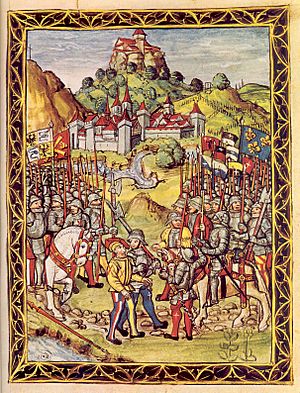Battle of Novara (1500) facts for kids
Quick facts for kids Battle of Novara |
|||||||
|---|---|---|---|---|---|---|---|
| Part of the Italian Wars and Second Italian War | |||||||
 Sforza is handed over to the French. Illustration from the Lucerne Chronicle (1513) |
|||||||
|
|||||||
| Belligerents | |||||||
| Commanders and leaders | |||||||
| Louis XII of France | Ludovico Sforza | ||||||
The Battle of Novara was an important fight that happened on April 8, 1500. It was part of the Italian Wars, a series of conflicts in Italy. This battle was between the army of Louis XII of France, who was the King of France, and the forces of Ludovico Sforza, who was the Duke of Milan. The French won this battle, which was a big moment in their efforts to control parts of Italy.
Contents
Preparing for Battle: The Armies Gather
Before the battle, the French army gathered its forces. On March 24, 1500, a French commander named Louis II de la Trémoille joined the main French army. He brought about 500 soldiers and some powerful cannons. Soon after, 10,000 Swiss mercenaries also joined the French side. These Swiss soldiers were hired fighters, known for being very skilled in battle. By April 5, the entire French army was ready. They marched towards Novara to face the Milanese forces.
The Unique Role of Swiss Soldiers
Interestingly, there were many Swiss mercenaries on both sides of this battle. Both the French and the Milanese armies had hired Swiss soldiers. The Swiss had a special rule in their contracts: they would not be forced to fight against other Swiss soldiers. This meant that even though they were serving different leaders, they often saw each other as fellow countrymen. They would even drink together when they were not fighting. This rule would become very important during the Battle of Novara.
The Battle Begins and Retreat
The fighting at Novara started on April 8. When the battle began, the Swiss soldiers fighting for Ludovico Sforza refused to attack the Swiss soldiers on the French side. This was because of their special contract rule. The French army used their cannons, which caused Sforza and his army to retreat. They pulled back into the fortress of Novara. A few days later, the French army surrounded the fortress, starting a siege. La Trémoille, the French commander, also set up defenses between Novara and Tessin. This was to block Sforza's escape route to Milan.
Surrender and Capture
During the night of April 9, the Swiss soldiers serving Sforza decided to give up. They started talking with the French about surrendering. The German Landsknechts, who were also hired soldiers, quickly did the same. By April 10, 1500, an agreement was made. The Swiss and Landsknechts were allowed to go home with their belongings. They just had to lay down their weapons.
However, Sforza's other soldiers, the Lombards and the stratioti (who were light cavalry from Albania and Greece), tried to escape. They came out of Novara and tried to cut their way along the road to Tessin. But the French forces attacked them.
Meanwhile, the Swiss soldiers were leaving in small groups. The French carefully checked them, looking for Ludovico Sforza. They believed he might be hiding among them. Two of Sforza's companions eventually gave him up to the French.
The Fate of Ludovico Sforza
After being captured, Ludovico Sforza was taken to France. He was imprisoned in the Château de Loches. He was held in a small cell. For a while, he was not allowed to have books. In 1504, he was given a bit more freedom. However, he died in 1508 while still a prisoner. The Battle of Novara was a major defeat for Sforza and ended his rule as Duke of Milan.
See also
 In Spanish: Batalla de Novara (1500) para niños
In Spanish: Batalla de Novara (1500) para niños
- List of battles of the Italian Wars
 | Percy Lavon Julian |
 | Katherine Johnson |
 | George Washington Carver |
 | Annie Easley |

